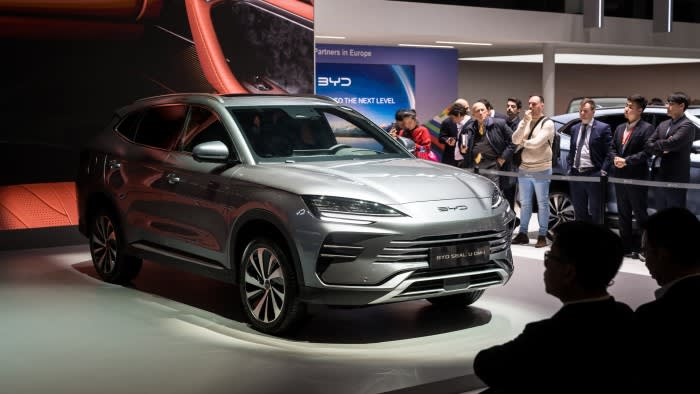
Stay informed with free updates
Simply sign up to the Electric vehicles myFT Digest — delivered directly to your inbox.
BYD has rejected EU accusations that the success of Chinese car companies stemmed from state aid as Brussels forges ahead with a probe into whether local subsidies were helping electric cars made in China undercut European-made models.
“Our success is not because of the subsidy, it’s because we have unique technology . . . and our management efficiency is high,” said Michael Shu, European president of BYD, one of China’s leading auto groups.
“It’s because we invested in this technology much earlier, and much more, than competitors. It’s not because of the subsidy,” he added in the company’s first public comment on the probe launched last year.
The European Commission’s investigation into Chinese competitiveness in the electric vehicle market is widely expected to lead to higher tariffs. China’s ambassador to Europe previously called the move “unfair”.
The manufacturing subsidies the carmaker receives from China are “very limited”, Shu told the Financial Times in an interview at the Geneva Motor Show.
Carmakers such as Renault and Stellantis have warned that a wave of cheaper Chinese models will undercut those produced by European companies. But Shu said of the established industry: “They are afraid they cannot offer a competitive price.”
BYD, which is backed by Warren Buffett, has launched three models across Europe and is expanding its line-up and sales countries. Shu previously said the company aimed to be one of the top EV sellers in the region by 2030.
He said the company’s cost was “getting lower” as it produced more cars. The business has also launched its own ship to transport vehicles from China to Europe, which further reduces costs, he added.
Although any increase in tariffs may affect the speed of its rollout, “we are making some preparations . . . we will try our best to stabilise the sales price of the products in the market”, he said. Keeping prices stable “is quite important for long term relationship with customers, and brand image”.
Higher tariffs may in fact lead the carmaker to increase the planned capacity of the new EV factory it is building in Hungary, to reduce the number of imported cars, he added.
BYD expects to begin producing cars from the plant before the end of next year, despite having only announced the project in December, an incredibly rapid pace for an industry where factories can take four or more years to complete.
Shu said the Hungary plant planned to produce at least 150,000 cars a year, a minimum level for standard car factories. “We are still discussing how fast we can go and how many cars we can sell”, but it has to be at least 150,000 “otherwise the cost will be too high”.
BYD has not disclosed investment figures yet because it is still in negotiations with the EU over financial support for the project, he said.
The group already runs a battery factory in the country, and chose the site of the factory in Szeged because it is close to the university that the company sees as a potential recruiting ground.
The company has also launched its own car-carrying vessel to ship vehicles from China, an industry first. The move reduces its emissions by using greener fuel and cuts the company’s transportation costs compared with outsourcing its shipments to other companies, Shu said.
“Shipping capacity is an important bottleneck,” he said, adding the new vessel could sail at “BYD’s planning” rather than leaving cars in port waiting for a ship, which was expensive.